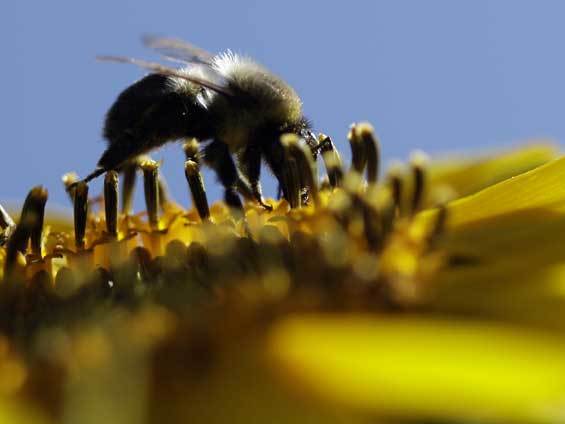Dozens of bee species extinct or on verge of disappearing across UK, study finds
‘Many are battling to keep up with the changing face of their landscape and increasingly hot weather’

Your support helps us to tell the story
From reproductive rights to climate change to Big Tech, The Independent is on the ground when the story is developing. Whether it's investigating the financials of Elon Musk's pro-Trump PAC or producing our latest documentary, 'The A Word', which shines a light on the American women fighting for reproductive rights, we know how important it is to parse out the facts from the messaging.
At such a critical moment in US history, we need reporters on the ground. Your donation allows us to keep sending journalists to speak to both sides of the story.
The Independent is trusted by Americans across the entire political spectrum. And unlike many other quality news outlets, we choose not to lock Americans out of our reporting and analysis with paywalls. We believe quality journalism should be available to everyone, paid for by those who can afford it.
Your support makes all the difference.Many species of bee are on the brink of extinction in parts of the UK – and some types have been lost entirely, a report has found.
Climate change, habitat loss, pollution and disease are threatening the pollinators, the analysis of 228 species concluded.
It discovered that 17 species were regionally extinct – including the Great Yellow Bumblebee, the Potter Flower Bee and the Cliff Mason Bee – with 25 types threatened and another 31 of conservation concern.
The bee’s pollinating services are worth £690m a year to the UK economy.
Published on World Bee Day, the ‘Bees Under Siege’ report by WWF and Buglife recommends a number of conservation actions to help reverse declines:
- Ensure that coastal management plans protect coastal habitats and promote the management of sea walls
- Safeguard wildlife-rich brownfield sites and promote beneficial management
- Identify opportunities to connect disjointed habitat fragments and promote coordinated management between landowners and landholdings
- Local authorities can work with and support local communities in urban areas to restore and create new habitats
- Ongoing survey and monitoring of bee populations
- Maintain and increase awareness, advice, support and funding for practical delivery projects.
- The report also called on the new Westminster Environment Bill to be “ambitious enough” to develop a nature recovery network for bees.
The research centres were in Bedfordshire, Cambridgeshire, Essex, Hertfordshire, Norfolk and Suffolk – all home to nationally and internationally significant pollinating populations.
International scientists nearly three weeks ago warned of the world’s alarming loss of biodiversity.
Just weeks ago, a separate report warned that wild pollinating insects have vanished from a quarter of their former habitats across Britain.
Last year the European Union agreed to ban neonicotinoids, the world’s most widely used insecticides, from all fields because they were killing bees.
Urban beekeeping is now considered another threat to wild populations, by creating fierce competition for food and even spreading disease.
Tanya Steele, chief executive at WWF, said: “The UK is one of the most nature-depleted countries in the world, and the fact that our precious pollinators are in peril is a sad illustration of the dramatic decline in wildlife we’re seeing all around us.
“We desperately need targeted action if we’re going to bring under-pressure wildlife back from the brink.
“The Environment Act gives us a golden opportunity to restore our natural world – we need to ensure it’s ambitious enough to do that.”
Matt Shardlow, chief executive at Buglife, said: “Our study found that many of the rarer, more specialist bees are battling to keep up with the changing face of their landscape and increasingly hot weather.
“Although a few species have expanded their populations and range, more species are in decline, 17 species are already extinct in the region and another six species are now so endangered they are only known to survive on single sites – this is a very unhealthy picture.”
A spokesman for the Department of Environment, Food and Rural Affairs said: “We are working hard to support our bees and other pollinators – as these species are essential for pollinating crops and in turn human survival.
“Through our 25-Year Environment Plan, we have already committed to developing a Nature Recovery Network to protect and restore wildlife, and our Biodiversity and National Pollinator strategies have helped to create over 130,000 hectares of wildlife-rich habitat.
“Furthermore the Bees Needs campaign brings together conservation groups, farmers, beekeepers to promote good practical advice so we can all do more to provide suitable habitats for bees and other insects.”
Join our commenting forum
Join thought-provoking conversations, follow other Independent readers and see their replies
Comments